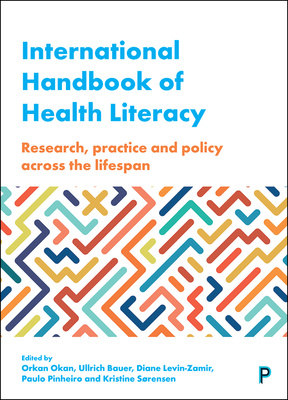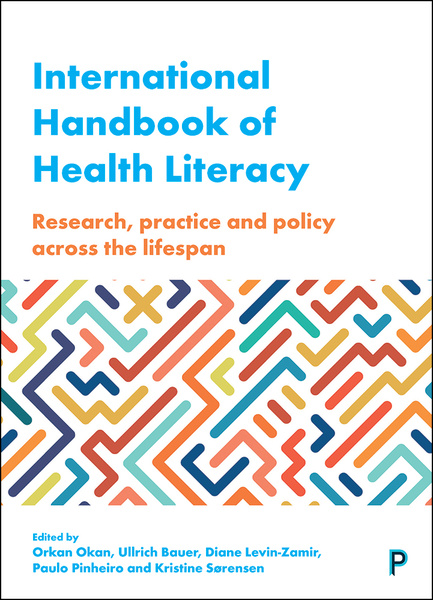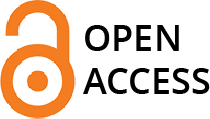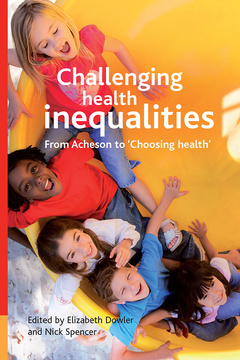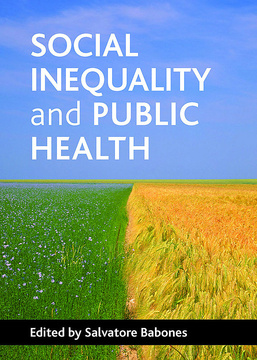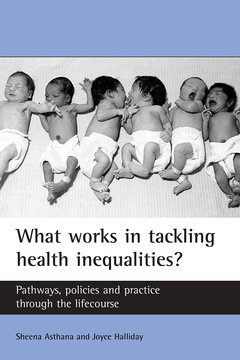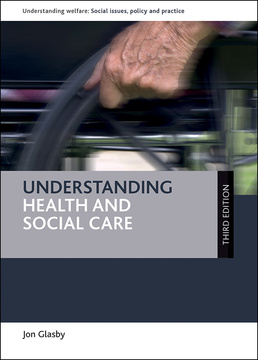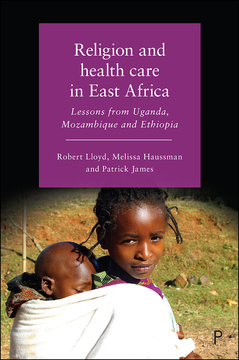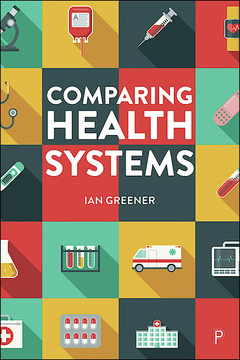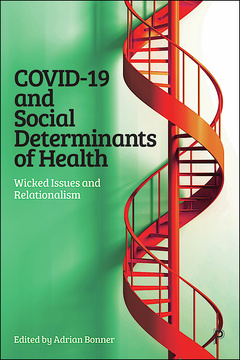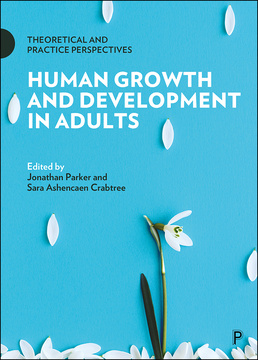International Handbook of Health Literacy
Research, Practice and Policy across the Life-Span
Edited by Orkan Okan, Ullrich Bauer, Diane Levin-Zamir, Paulo Pinheiro and Kristine Sørensen
Published
Jul 31, 2019Page count
768 pagesISBN
978-1447344513Dimensions
240 x 172 mmImprint
Policy PressPublished
Jul 31, 2019Page count
768 pagesISBN
978-1447344537Imprint
Policy PressPublished
Jul 31, 2019Page count
768 pagesISBN
978-1447344537Imprint
Policy PressPublished
Jul 31, 2019Page count
768 pagesISBN
978-1447344520Imprint
Policy PressAvailable Open Access under CC-BY-NC licence. Health literacy addresses a range of social dimensions of health, including knowledge, navigation and communication, as well as individual and organizational skills for accessing, understanding, evaluating and using information. Particularly over the past decade, health literacy has globally become a major public health concern as an asset for promoting health, wellbeing and sustainable development.
This comprehensive handbook provides an invaluable overview of current international thinking about health literacy, highlighting cutting edge research, policy and practice in the field. With a diverse team of contributors, the book addresses health literacy across the life-span and offers insights from different populations and settings. Providing a wide range of major findings, the book outlines current discourse in the field and examines necessary future dialogues and new perspectives.
“The editors bring together a truly international set of papers… As a collected work, the International Handbook of Health Literacy affirms the relevance of health literacy across a wide range of disciplines.” Knowledge for Healthcare
“As a field of study and practice we benefit from international thinking about health literacy as a public health priority. This book is a much needed resource for improving health literacy locally, regionally and globally.” Sabrina Kurtz-Rossi, International Health Literacy Association
“Achieving health literacy for all should be a goal for progressive societies everywhere. This book serves as an invaluable resource to clinicians, public health practitioners and policy makers across the globe to help meet that goal.” Dean Schillinger, University of California San Francisco
“Over the past decades, the evolution of health literacy in the advancement of health and well-being of people globally advances with great promise. This book offers multiple perspectives with providing fundamentals for those in multiple fields with examples with research and practice linking new technologies, communication and public health.” Scott Ratzan, Harvard Kennedy School
Orkan Okan is Scientist at the Interdisciplinary Centre for Health Literacy Research based in the Faculty of Educational Science at Bielefeld University, Germany, with interest in health literacy in children and adolescents.
Ullrich Bauer is Professor of Socialisation Research and Head of the Centre for Prevention and Intervention in Childhood and Adolescence and the Interdisciplinary Centre for Health Literacy Research at Bielefeld University, Germany.
Diane Levin-Zamir is the National Director - Department of Health Promotion in Clalit Health Services, Associate Professor at the University of Haifa, School of Public Health, Israel, and Co-convener of IUHPE Global Working Group on Health Literacy.
Paulo Pinheiro is Senior Researcher at the Faculty of Educational Science, Bielefeld University, Germany.
Kristine Sørensen is Founding Director of the Global Health Literacy Academy. She is the first President of the International Health Literacy Association, Chair of Health Literacy Europe and Advisor to the WHO.
Introduction to the Book;
Part 1: Research into health literacy - An overview of recent developments;
Introduction to Part 1;
The many facets of health literacy: Scoping the current research of theories, concepts, and models;
1. Defining health literacy: Exploring differences and commonalities ~ Kristine Sørensen;
2. From Saranac Lake to Shanghai: A brief history of health literacy ~ Orkan Okan;
3. Health literacy of children and adolescents: Conceptual approaches and developmental considerations ~Janine Bröder and Graca S. Carvalho;
4. The concept of mental health literacy ~ Anthony F. Jorm;
Measuring health literacy: What, why and how?;
5. Measuring health literacy in adults: An overview and discussion of current tools ~ Andrew Pleasant, Caitlin Maish, Catina O’Leary and Richard Carmona;
6. Measuring children’s health literacy: Current approaches and challenges ~ Torsten M. Bollweg and Orkan Okan;
7. Developing an instrument for measuring health literacy of adolescents: Lessons learned ~ Christiane Firnges, Olga Domanska and Susanne Jordan;
8. Measuring Health Literacy in Europe: Introducing the European Health Literacy Survey Questionnaire (HLS-EU-Q) ~ Jürgen Pelikan, Kristin Ganahl, Stephan van den Broucke and Kristine Sørensen;
Health literacy, health outcomes and health inequalities: Some empirical findings;
9. Health literacy and health disparities: A global perspective ~ Sarah Mantwill and Nicola Diviani;
10. Health literacy in later phases of life: Findings from Germany and other countries ~ Dominique Vogt, Doris Schaeffer and Eva-Maria Berens;
11. Critical health literacy for the marginalised: Empirical findings ~ Susie Sykes and Jane Wills;
12. Health literacy and chronic conditions: A life course perspective ~ Gillian Rowlands, Joanne Protheroe, Luis Saboga-Nunes, Stephan Van den Broucke, Diane Levin-Zamir, and Orkan Okan;
13. Health literacy research in the Nordic Countries ~ Kristine Sørensen and Josefine Wangdahl;
Part 2: Programmes and interventions to promote health literacy;
Introduction to Part 2;
An overview of interventions and programmes;
14. Improving health literacy in clinical and community populations ~ Don Nutbeam and Bronwyn McGill;
Interventions and programmes for children and adolescents;
15. MEDIA PROTECT: A setting- and parent-targeted intervention for a healthy childhood in the digital age ~ Paula Bleckmann, Hanna Schwendemann, Simone Flaig, Lea Kuntz, Anja Stiller, Thomas Mößle and Eva-Maria Bitzer;
16. Using photovoice as a participatory approach to promote youth health literacy ~ Paola Ardiles, Marlies Casteleijn, Charlene King and Kristine Sørensen;
17. Mental health literacy for refugee youth: A cultural approach ~ E. Anne Marshall and Deborah L. Begoray;
18. Media health literacy, ehealth literacy and health behaviour across the lifespan: Current progress and future challenges ~ Diane Levin-Zamir and Isabella Bertschi;
19. School-based mental health literacy interventions ~ Kathryn Cairns and Alyssia Rossetto;
20. Health literacy interventions for children or adolescents: An overview and insights into practical applications ~ Andrew Pleasant, Kristen Haven Griffin, Caitlin Maish, Catina O’Leary and Richard Carmona;
Interventions and programmes for adults and older adults;
21. Health literacy interventions in the delivery of pharmaceutical care ~ Laura J. Sahm, Suzanne McCarthy and Sarah Marshall;
22. A stated preference discrete choice health literacy intervention framework for the control of non-communicable diseases (NCDs) in Africa: A qualitative perspectives for sustainable development ~ Kenneth Yongabi Anchang and Theckla Kwangsa Mbunwe;
23. Occupational health literacy: Healthy decisions at work ~ Marie Birk Jørgensen and Anne Konring Larsen;
24. Mental health literacy interventions in adults ~ Anthony F. Jorm;
25. An empirical perspective on the concept of mental health literacy in the field of families with parental mental illness ~ Kathrin Schulze, Patricia Wahl, Dirk Bruland, Stefanie Harsch and Michael Rehder;
26. Putting the literacy back in health literacy: Interventions in U.S. adult literacy and English language programmes ~ Julie McKinney and Maricel G. Santos;
Part 3: Policy programmes to promote health literacy;
Introduction to Part 3;
27. Health literacy policies: European perspectives ~ Iris van der Heide, Monique Heijmans and Jany Rademakers;
28. Developing health literacy policy in Scotland: A case study ~ Graham Kramer, Blythe Robertson, Phyllis Easton and Andrew Pearson;
29. Health literacy policies: National examples from Canada ~ Sandra Vamos, Irving Rootman, Linda Shohet and Lorie Donelle;
30. Health literacy policies: National example from Austria – a unique story and some lessons learned: key success factors and caveats from an ongoing journey ~ Peter Nowak, Christina Dietscher and Marlene Sator;
31. Health literacy policy in Australia: Past, present and future directions ~ Anita Trezona, Emma Fitzsimon and Sarity Dodson;
32. Health literacy policies: National examples from the United States ~ Julie McKinney and R.V. Rikard;
33. Health literacy in New Zealand: A tale of serendipity and indigenous health ~ Susan Reid and Carla White;
34. Health literacy and the school curriculum: The example of Finland ~ Olli Paakkari and Leena Paakkari;
Part 4: Future dialogue and new perspectives;
Introduction to Part 4;
35. Health-literate healthcare organisations ~ Jürgen Pelikan and Christina Wieczorek;
36. Future avenues for health literacy: Learning from literacy and literacy learning ~ Paulo Pinheiro;
37. The social embeddedness of health literacy ~ Ullrich Bauer;
38. Children as active participants in health literacy research and practice? From rhetoric to rights ~ Emma Bond and Vanessa Rawlings;
39. Health literacy practices of adults in an avatar-based immersive social virtual world: A sociocultural perspective of new media health literacies ~ Evelyn McElhinney;
40. Health literacy and participation in the healthcare of adults: (In)compatible approaches? ~ Melanie Messer;
41. A lifespan perspective on health literacy: Aging and end-of-life issues ~ Barbara Kondilis;
42. Salutogenesis and health literacy: The health promotion simplex! ~ Luis Saboga-Nunes, Uwe H. Bittlingmayer and Orkan Okan;
43. Health literacy in a social context: A meta-narrative review ~ Ruth Pitt, Terry Davis, Jennifer Manganello, Phillip Massey, Orkan Okan, Elizabeth McFarlane, Opal Vanessa Buchthal, James Davis, Connie Arnold and Tetine Sentell;
44. Health literacy for all? Inclusion as a serious challenge for health literacy ~ Uwe H. Bittlingmayer and Diana Sahrai;
45. Capacity building for health literacy ~ Stephan van den Broucke.







